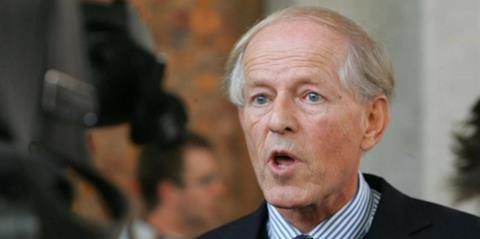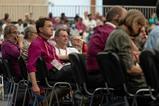Andrew Graystone battled for decades to reveal the truth about serial abuser John Smyth. Now as a report confirms Smyth’s abuse was “prolific, brutal and horrific,” Andrew says church leaders must repent of their wilful blindness

As child, if I was caught doing something naughty, my grandfather sometimes used to urge me to “tell the truth and shame the devil”.
The expression originates from a sermon by the 16th century bishop Hugh Latimer. He kept to this principle so faithfully that he was eventually burned at the stake for refusing to deny his faith.
I thought of this as I read the report published last week by the Church of England into its decades-long mishandling of the revelations of abuse by evangelist and barrister John Smyth. The shameful report records that Smyth’s abuse in England and Africa was “prolific, brutal and horrific.”
If anything could be worse than the abuse of children and young men, it is the industrial scale of cover-up that followed.
Dozens of senior church leaders knew about Smyth’s abuse as early as 1982. But they held secret meetings to make sure that it did not emerge. A report was written, detailing the scale and gravity of the offences. It made clear that what Smyth had been doing was against the law, and also immoral and unchristian. But the report was sealed in an envelope and given to the leaders of what is now the Titus Trust, with an instruction that it was “not to be opened until it was needed”. That envelope was not opened until 35 years later, when a brave survivor came forward to the Church of England.
Even once the details of the abuse had reached the Archbishop of Canterbury’s desk in August 2013, no effective action was taken, either by him or any of the other senior church leaders who knew, to bring Smyth to justice, or even to stop him abusing. In fact Smyth carried on meeting with young men for naked exercise and intimate talks until his death in 2018.
I have battled to get the story of Smyth’s abuse and the church’s cover-up into the public domain since I first heard about it in 2015. I still worry about those young men in South Africa who may have been abused in the few months that it took me to get the word out. It isn’t easy to share news about fellow Christians’ failings in a responsible way. At times, some people have accused me of betraying the church, or even doing the Devil’s work.
I thought it would do the work of God immense damage if this were public - David Fletcher
One of the most shocking revelations of the report came from the late David Fletcher. Fletcher ran the Iwerne Camps network alongside Smyth. When he stopped working for the camps, he became chair of the Iwerne Trust and its successor, the Titus Trust. The camps were his life’s work. He stayed on the trust until the history of abuse was revealed.
By then, David Fletcher had known in detail about Smyth’s abusive career for 35 years. So why did he and the others not act to stop Smyth? In an interview with the reviewer shortly before his death, Fletcher said “I thought it would do the work of God immense damage if this were public.”
This offers some explanation for the motivation behind those who initially covered up the abuse. One of those was Canon Mark Ruston, who wrote the initial internal report into the abuse in 1982. He told Fletcher that he was worried about “the effect on evangelism” if the beatings became more widely known. In other words, both men thought that telling the truth would shame the church, not the Devil.
This is not the first time we have heard of secrets being kept by church leaders for what they thought was the greater good. There are similar allegations against some of those who knew about the abuses of Mike Pilavachi. Fiona Scolding, the barrister who reviewed the Pilavachi disaster called this “wilful blindness” - a deliberate choice to turn a blind eye for the sake of the kingdom.
God is not looking to us to manage God’s reputation
I have seen this many times in church life, when people don’t want to speak about the evil they have seen, for fear of damaging God’s work. It’s deeply mistaken. It makes the church, or Soul Survivor, or Iwerne Camps, and their earthly powers and privileges, more important than God. It allows evil to flourish in the shadows. And in the end, it is doomed to failure. God knows the secrets of our hearts. God is not looking to us to manage God’s reputation. God’s plan for the world includes the church, but it doesn’t depend on any one person or project, however great.
A bishop once said to me that “every bishop has a drawer where they keep the things they don’t want the press to discover”. I was appalled. There is no place in Christian leadership for secrets. It is our role as Christians to shed light, even when it is uncomfortable. We are to stand up for the truth above everything, even if it challenges our favourite leaders or institutions. That’s why Christian leaders have so much in common with good journalists, scientists and teachers. We are all in the business of telling the truth, even if it challenges all the things we hold dear. At the heart of God’s plan for the world is the defeat of the Prince of Lies by the one who is the Way, the Truth and the Life.





































2 Readers' comments